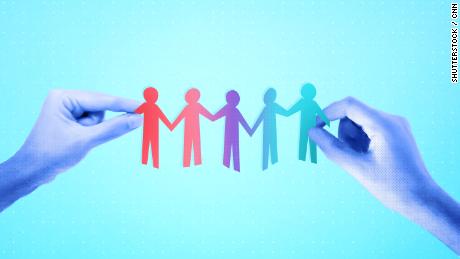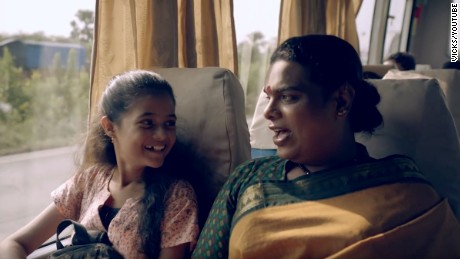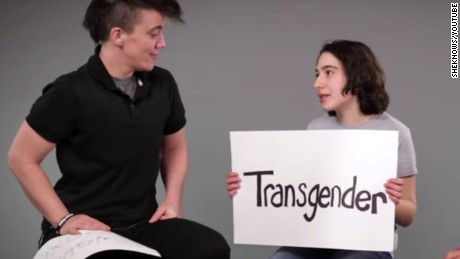
Indian state leads way for transgender rights
The transgender community is among the most marginalized in India, with access to education and subs..
The transgender community is among the most marginalized in India, with access to education and subsequently jobs mostlynonexistent, according to experts.Kerala's move to secure places in higher education is among the first initiatives in the country to help support their progress. But the move, which has been welcomed by the transgender community, has also been met with skepticism over its viability by activists who highlight the likely ignorance of students and faculty at these universities. Students will face discrimination along with a lack of viable accommodation options, they believe. "If there is no access to hostels or no access to bathrooms, just like it's for disabled people, [transgender people] disappear," said Vikramaditya Sahai, a consultant with the Tata Institute of Social Scienceswho is transgender.The new policy will apply to government colleges across the state and will require two seats in every college class to be held exclusively for transgender students."Due to societal issues these students often have to discontinue their studies or to join other academic institutions after an academic year or after the admission process is closed," the notice says.Social stigma involved with coming out as transgender often forces teens to run away from home or sees them disowned by their families. Some are unable to continue their education due to discrimination and humiliation from peers.But Kerala has launched initiatives to encourage inclusivity for transgender people. Last year, authorities announced government jobs for transgender people in the state's metro system. The state has also provided welfare plans for the community. Other states, such as Tamil Nadu in the south, have also introduced policies to help transgender people in recent years. For example, the Tamil Nadu Transgender Welfare Board addresses social protection needs like housing, health care, income assistance and skills training. But Kerala is considered to be amongst the most progressive states in the country.
"If there is no access to hostels or no access to bathrooms, just like it's for disabled people, [transgender people] disappear," said Vikramaditya Sahai, a consultant with the Tata Institute of Social Scienceswho is transgender.The new policy will apply to government colleges across the state and will require two seats in every college class to be held exclusively for transgender students."Due to societal issues these students often have to discontinue their studies or to join other academic institutions after an academic year or after the admission process is closed," the notice says.Social stigma involved with coming out as transgender often forces teens to run away from home or sees them disowned by their families. Some are unable to continue their education due to discrimination and humiliation from peers.But Kerala has launched initiatives to encourage inclusivity for transgender people. Last year, authorities announced government jobs for transgender people in the state's metro system. The state has also provided welfare plans for the community. Other states, such as Tamil Nadu in the south, have also introduced policies to help transgender people in recent years. For example, the Tamil Nadu Transgender Welfare Board addresses social protection needs like housing, health care, income assistance and skills training. But Kerala is considered to be amongst the most progressive states in the country. In a 2015 policy, the state government announced broader access to education, health care, social security and nondiscrimination initiatives for trans people, like legal redress against parents for child abandonment or police officials in cases of violation of human rightsAwareness and an understanding of the community are among the first steps in inclusivity, Sahai says. College professors are verbally abusive, and students follow. "Schools are horrible for trans people.""I am very happy about the move that came from the government, but what steps have been taken for sensitization by them?" asked transgender activist and artist Kalki Subramanium of Tamil Nadustate, who is founder of the Sahodri Foundation, which works for transgender rights. "When a trans person walks in the campus, they should not be bullied. Opening the doors is important, but is it going to be peaceful, friendly and inclusive?"
In a 2015 policy, the state government announced broader access to education, health care, social security and nondiscrimination initiatives for trans people, like legal redress against parents for child abandonment or police officials in cases of violation of human rightsAwareness and an understanding of the community are among the first steps in inclusivity, Sahai says. College professors are verbally abusive, and students follow. "Schools are horrible for trans people.""I am very happy about the move that came from the government, but what steps have been taken for sensitization by them?" asked transgender activist and artist Kalki Subramanium of Tamil Nadustate, who is founder of the Sahodri Foundation, which works for transgender rights. "When a trans person walks in the campus, they should not be bullied. Opening the doors is important, but is it going to be peaceful, friendly and inclusive?"
Prohibiting discrimination
In 2014, the Supreme Court of India established rights of equality and equal protection for transgender people nationwide. A bill expanding the rights of the community is due to be made into law in the upcoming Parliament session beginning Wednesday.The bill, introduced by the government in 2016, prohibits discrimination andcriminalizes forced labor, begging and sexual abuse of transgender people. But the initial draft was met with anger and disgust from the transgender community. Nationwide protests began against the measure's absence of affirmative action, the vague definition of sexual assault, the penalty for this crime and, most significantly, the definition of the term transgender. "A 'transgender person' means a person who is neither wholly female nor wholly male or a combination of female or male or neither female nor male; and whose sense of gender does not match with the gender assigned to that person at the time of birth, and includes trans-men and trans-women, persons with intersex variations and gender-queers," the bill said.A government committee announced recommendations and amendmentsin June 2017."Anything for [transgender people's] betterment can't be one step forward and three steps backwards," said Anitha Shenoy, a lawyer with the Supreme Court.According to Shenoy, the previous draft of the bill focused on a person's biological gender rather the psychological gender.The government has not made the latest draft of the bill available.
"A 'transgender person' means a person who is neither wholly female nor wholly male or a combination of female or male or neither female nor male; and whose sense of gender does not match with the gender assigned to that person at the time of birth, and includes trans-men and trans-women, persons with intersex variations and gender-queers," the bill said.A government committee announced recommendations and amendmentsin June 2017."Anything for [transgender people's] betterment can't be one step forward and three steps backwards," said Anitha Shenoy, a lawyer with the Supreme Court.According to Shenoy, the previous draft of the bill focused on a person's biological gender rather the psychological gender.The government has not made the latest draft of the bill available. The bill provides the recognition that trans people need, but it is just a symbolic gesture, Sahai said.However, the 30-year-old feels that it is not doing enough and is too restrictive. "It's a bill that does not recognize what trans lives are like, that does not recognize the multidimensionality of trans people," he said.Amnesty International India issued a statement in support of the amendments and launched a petition on it in August. "Amnesty International India is deeply concerned that the Bill, if passed in its current form, will undermine the rights of transgender and intersex persons," the statement read.
The bill provides the recognition that trans people need, but it is just a symbolic gesture, Sahai said.However, the 30-year-old feels that it is not doing enough and is too restrictive. "It's a bill that does not recognize what trans lives are like, that does not recognize the multidimensionality of trans people," he said.Amnesty International India issued a statement in support of the amendments and launched a petition on it in August. "Amnesty International India is deeply concerned that the Bill, if passed in its current form, will undermine the rights of transgender and intersex persons," the statement read.
Issues faced by transgender people
In a country with deep-rooted discrimination that cuts across religion, region and gender, transgender people have become the greatest outliers.Reports show that heavily ingrained prejudice often forces trans people to run away from home in their teens, before they are thrown out by their families. Forced to assimilate in a community that has refused to provide them with education or jobs, they often turn to begging on the streets or prostitution. According to the 2011 census, there are more than480,000 registered transgender people in India.Physical and sexual violence against transgender people is extremely high, and the new bill recommends up to two years imprisonment for physical and sexual abuse."It basically trivializes the crime," Sahai said. "Thank you for recognizing sexual violence, but no thank you for the two years."India has tightened sexual assault and rape laws in recent years. In April, a temporary law was introduced to award the death penalty in certain rapes cases of minor girls, and the punishment for gang rape of adult women was increased to a life term.However, transgender people do not find a mention in any of these amendments. "If you look at the Indian penal code, there are so many subclassifications. They range from molestation, assault, to rape and penetrative sex. Here (in the bill) it is very loosely worded," Shenoy said.
According to the 2011 census, there are more than480,000 registered transgender people in India.Physical and sexual violence against transgender people is extremely high, and the new bill recommends up to two years imprisonment for physical and sexual abuse."It basically trivializes the crime," Sahai said. "Thank you for recognizing sexual violence, but no thank you for the two years."India has tightened sexual assault and rape laws in recent years. In April, a temporary law was introduced to award the death penalty in certain rapes cases of minor girls, and the punishment for gang rape of adult women was increased to a life term.However, transgender people do not find a mention in any of these amendments. "If you look at the Indian penal code, there are so many subclassifications. They range from molestation, assault, to rape and penetrative sex. Here (in the bill) it is very loosely worded," Shenoy said.
Small steps forward
Even with discrimination, lack of affirmative action and a poor understanding of culture, the government has checked some boxes to improve the lives of trans people.For thousands in the transgender community, hope hinges on the changes that they hope the new bill will bring. "If a new bill is formed and this bill takes up the recommendations, that would be the only solution," Subramanium said.For now, the community waits for the Indian Parliament to decide their rights."It is a good step. If you are trying to take the step, do it well. Don't play with us. Don't trick us," Sahai said.
Original Article

